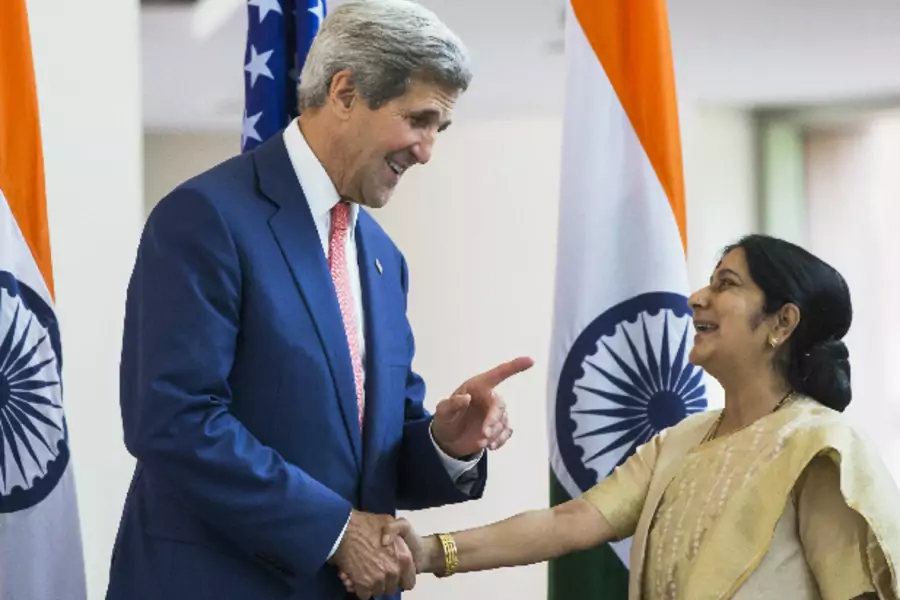Friday Asia Update: Top Five Stories for the Week of August 1, 2014

More on:
Ashlyn Anderson, Lauren Dickey, Darcie Draudt, Andrew Hill, Will Piekos, and Sharone Tobias look at the top stories in Asia today.
1. Amid a slew of world crises, U.S. secretary of state John Kerry travels to India. Kerry, accompanied by U.S. secretary of commerce Penny Pritzker, arrived in New Delhi for the fifth Indo-U.S. Strategic Dialogue to identify avenues for bilateral cooperation on trade, investment, and security, marking the first cabinet-level meeting between the Obama administration and the new Indian government. The visit also coincides with the deadline for the WTO trade facilitation deal, which India has threatened to block (even though a breakthrough agreement was reached in Bali last year); India’s top trade negotiators argue that the deal does not do enough for food security in developing countries. Kerry co-chaired the strategic dialogue with his counterpart, Sushma Swaraj, and met with Prime Minister Modi.
2. Zhou Yongkang formally under investigation for corruption. The former Politburo Standing Committee member and head of China’s domestic security apparatus is under investigation for “serious violations of discipline”—i.e., corruption—a major step in President Xi Jinping’s anti-corruption drive. Zhou, reportedly under scrutiny for some time, is the highest-level “tiger” to be swept up by Xi’s campaign. The move comes as little surprise, as members of Zhou’s political patronage network have been falling steadily over the past two years, but the audacity of Xi’s move—Party members at Zhou’s level have historically been untouchable—is stunning.
3. Abenomics creating problems for Tokyo Olympics preparations. With six years remaining to prepare for its second Olympic Games, Tokyo is already facing a number of setbacks. Iraqi-British architect Zaha Hadid has been forced to redesign her controversial new Olympic Stadium after critics derided it as too large, too expensive, and unsafe. Now Tokyo governor Yoichi Masuzoe has also announced that all ten new venues will be reviewed and possibly relocated. Part of the problem inadvertently comes from one of the Games’ foremost supporters, Prime Minister Shinzo Abe, who personally vouched for the safety of hosting the Games in Tokyo. While many hoped that hosting the Olympics in Tokyo would build on the success of Abenomics, the prime minister’s lauded efforts to bring growth and inflation back to a stagnant Japanese economy have also led to surging costs for construction materials due to a weakened yen and a labor shortage in the construction industry.
4. South Korea ruling party sweeps by-elections, wins control of parliament. The conservative Saenuri Party (“New Frontier” Party) took eleven of the fifteen contested seats on the July 30 elections, gaining them a majority in the National Assembly. Party leadership had predicted winning more than the four seats necessary to claim control of the legislature, but Saunuri was also able to win in unexpected regions. A win in the progressive South Jeolla region, the first by a conservative candidate since 1988, was particularly notable for the country noted for its political regionalism. Criticism of President Park Geun-hye, leader of the Saenuri Party, and her government’s handling of the Sewol Ferry disaster in April this year was predicted to hurt Saenuri’s popularity as well, but some voters may have felt the opposition party overpoliticized the Sewol incident and wanted to express their faith in the current government.
5. Myanmar president replaces two key cabinet ministers. President Thein Sein removed Information Minister Aung Kyi and Health Minister Pe Thet Khin on Tuesday by issuing orders that “allowed” them to resign from their respective duties. No reason has been given for the resignations. In a letter to parliament, President Thein nominated Deputy Minister of Information Ye Htut and Deputy Minister of Health Than Aung as replacements. In an apparent bid to step up reforms before elections next year, these changes occur amid tighter restrictions on media and international criticism over the expulsion of Doctors Without Borders from areas hit by sectarian strife.
Bonus: Communist Party squares. Officials in Tonghe County of Heilongjiang Province were anxious to complete a running track before the visit of a provincial-level leader—so anxious, in fact, that building an oval track would be too time consuming. Naturally, the logical and most impressive solution would be to build a track with four corners. No word on how impressed the leader was, though.
More on:
 Online Store
Online Store